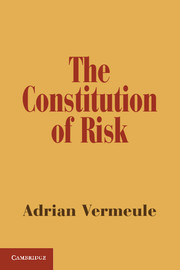2 - Optimizing Constitutionalism: The Mature Position
Published online by Cambridge University Press: 05 June 2014
Summary
The last chapter defined and illustrated precautionary constitutionalism, attempting to put that approach in its best light. This chapter turns to criticisms of constitutional precautions offered by early proponents of national power such as Hamilton, Marshall, and Story, and by New Dealers such as Frankfurter and Jackson. These critics argued that precautionary constitutionalism might prove futile for lack of incentive-compatibility; might jeopardize other values, resulting in greater risks overall; might prove perversely self-defeating, if and because the precautions create or exacerbate the very risks they were intended to prevent; and might prove unnecessary, given the availability of after-the-fact remedies against materialized risks. As we will see, these criticisms of precautionary constitutionalism parallel the criticisms of precautionary principles in the theory of regulation. Critics of precautionary regulation are following a path that the critics of precautionary constitutionalism have already traveled.
I argue that the modern theory of risk regulation has arrived at a conclusion that is structurally equivalent to Hirschman’s mature position. On this view, the goal of regulators should simply be to take optimal precautions, according to a calculus that weighs all relevant risks of action and inaction. As it turns out, however, constitutional theorists such as Publius and Story already endorsed the mature position, arguing in their own language for a resolutely optimizing approach to constitutionalism. What’s new is, in this case at least, very old.
- Type
- Chapter
- Information
- The Constitution of Risk , pp. 52 - 88Publisher: Cambridge University PressPrint publication year: 2013



